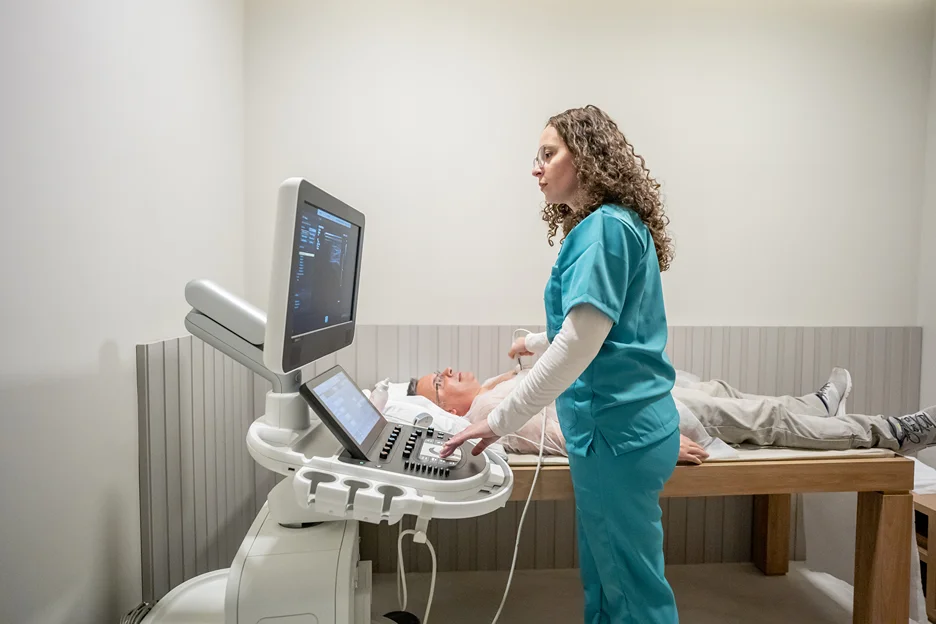Key Links, Warning Signs, and Actions
At Kaly, we want to educate you about the potential connections between neck pain complaints and heart attack risks.
While neck discomfort rarely signals an impending heart attack alone, understanding possible warning signs and getting evaluated quickly is crucial.
Read on as we provide an in-depth look at how neck pain might relate to a heart attack, key symptoms to watch for, and steps to take if you have any concerns.
Understanding Heart Attacks
First, let’s briefly overview what exactly happens during a heart attack. The heart is a muscular organ relying on a constant supply of oxygen-rich blood delivered through the coronary arteries.
A heart attack, also called a myocardial infarction, occurs when one of these arteries becomes blocked, preventing blood flow to the heart.
Heart attack blocks blood and oxygen to part of the heart muscle, causing damage or death of cardiac tissue.
This is usually caused by progressive atherosclerosis, where cholesterol plaque accumulation narrows the coronary arteries over time. Eventually, a plaque rupture can trigger a clot big enough to fully obstruct an artery, leading to a heart attack.
How Might Neck Pain Relate to a Heart Attack?
For the most part, neck pain and heart attacks involve two distinct areas of the body. However, pain signals can sometimes radiate in unexpected patterns. In certain cases, referred pain from a heart attack can be perceived in the neck area.
Possible explanations for neck pain associated with a heart attack include:
- Shared nerve supply – The vagus nerve provides sensory fibers to both the heart and neck. Irritation of this nerve can refer heart pain to the neck.
- Aching shoulders – Heart attack pain between the shoulder blades or radiating down the left arm can make neck muscles tense up protectively.
- Referred pain – The brain can misinterpret heart attack pain signals as coming from the neck rather than the heart.
- Anxiety tensing neck – Feeling anxious over concerning heart attack symptoms can increase neck muscle tension.
- Atypical symptoms – In some cases, like diabetes, heart attack symptoms present atypically, including as neck discomfort.
While neck pain alone is rarely the only symptom of a heart attack, being aware of your overall symptom pattern is key.
What are the most common symptoms that occur with a heart attack?
Chest tightness or pain, left arm/jaw/neck/back pain, shortness of breath, clammy sweating, nausea, fatigue, and lightheadedness are classic heart attack signs.
If I have neck pain, what other symptoms are cause for concern?
New neck pain combined with chest tightness, pain radiating to your arm/jaw/shoulders, or difficulty breathing warrant immediate emergency evaluation.
What conditions or factors increase the risk of heart attack?
High cholesterol, diabetes, kidney disease, stroke history, family history, smoking, obesity, sedentary lifestyle, hypertension, and chronic stress.
Warning Signs to Watch For

Heart attacks involve a cluster of related symptoms. If you develop any concerning signs, pay attention to whether they are also associated with new, unexplained neck pain:
- Chest tightness, pressure, squeezing, or pain
- Upper back discomfort between the shoulder blades
- Pain radiating down the left arm
- Jaw, neck, shoulder or upper back pain
- Shortness of breath
- Sweating or clamminess
- Nausea or vomiting
- Lightheadedness or dizziness
- Fatigue or weakness
While the classic heart attack signs like chest and left arm pain are well-known, be aware neck discomfort can also sometimes be involved.
High-Risk Conditions and Contributing Factors
Certain medical conditions or lifestyle factors can further raise your risk of developing cardiovascular disease that could potentially lead to a heart attack. Be especially alert for any new neck pain if you have:
- High cholesterol or triglyceride levels
- Diabetes mellitus
- Chronic kidney disease
- Peripheral arterial disease
- History of stroke
- Family history of heart disease
- Sedentary lifestyle
- Obesity
- Smoking
- High blood pressure
- Chronic stress
In these higher risk cases, new neck symptoms warrant particular attention and prompt evaluation.
What should I do at the first sign of symptoms?
If you notice any heart attack symptoms, particularly with new neck pain, call 911 immediately. Every minute of treatment delay matters.
How can I lower my heart disease and heart attack risk?
Leading a heart-healthy lifestyle with a nutritious diet, exercise, stress management, smoking cessation, and controlling other cardiac risk factors.
Cardiac Risk Assessment and Heart Attack Tests

If you develop any concerning heart attack-like symptoms, especially paired with new neck pain, time is of the essence.
Seek emergency care immediately, even if you are unsure. Call for an ambulance rather than driving yourself or having someone else drive you.
To evaluate if you are having a heart attack, doctors will:
- Check your medical history, risk factors, and describe your symptoms in detail.
- Perform an ECG to look for heart rhythm abnormalities indicating a heart attack.
- Draw blood to test for cardiac enzymes like troponin that are elevated when heart muscle dies.
- Potentially order further tests like an echocardiogram, stress test, or coronary angiogram to examine your heart.
Proceeding quickly through these triage steps is critical to determine if you are having a myocardial infarction so lifesaving treatment can begin right away.
Emergency Heart Attack Treatments
If testing confirms you are having a heart attack, emergency treatments will be administered, which may include:
- Oxygen
- Aspirin to prevent clotting
- Nitroglycerin to open blood vessels
- Morphine for pain relief
- Thrombolytic (“clot-buster”) medicines to dissolve clots
- Cardiac catheterization with angioplasty and stent placement to reopen the blocked artery
- Further medications to limit heart damage
Seeking immediate treatment at the first symptoms of a heart attack leads to the best outcomes and recovery.
Recovering after a Heart Attack
Following survival of a heart attack, the recovery journey has just begun. Important steps include:
Hospital monitoring – Close observation for complications like arrhythmias for several days.
Heart-healthy lifestyle changes – Smoking cessation, diet upgrade, increased physical activity, lower stress, and weight management.
Cardiac rehab – Medically supervised program to safely increase fitness.
Medications – Blood thinners, beta blockers, ACE inhibitors, statins, and more to prevent repeat heart attacks.
Follow-up testing – To assess ejection fraction, monitor for complications, and evaluate treatment effectiveness.
Addressing anxiety – Counseling or support groups to process the emotional trauma.
Activity pacing – Gradually increasing activity without overexertion.
Comprehensive long-term care gives you the best odds of recovery and avoiding future heart events.
Kaly Can Help You Take Action

Here at Kaly, we want to get you the right cardiac care as quickly as possible if you develop any heart attack warning signs. Our goal is to reduce delays, save heart muscle, and prevent complications. We can assist by:
- Informing you on heart attack risks, signs, and symptoms.
- Connecting you instantly with the nearest hospital ER.
- Coordinating transfer by ambulance if far from a hospital.
- Helping you access top cardiologists for follow-up care.
- Providing support throughout your recovery journey.
Don’t take chances with heart health.
Contact Kaly at the first sign of symptoms like chest, neck, or arm pain so we can urgently get you the treatment you need. We’re here to help protect your health today and in the years ahead.
FAQs: Neck Pain and Heart Attack Links
Could your neck pain be related to heart problems or an impending heart attack? Get informed by reviewing answers to frequent questions about the potential connections.
How might neck pain be associated with a heart attack?
Shared nerve supply, referred pain signals, shoulder tension from heart symptoms, or neck muscle spasms from heart attack anxiety can sometimes cause neck discomfort.
How do doctors test for a heart attack in the emergency room?
ECG, blood tests for cardiac enzymes like troponin, echocardiogram, stress testing, and coronary angiography to diagnose heart attack and detect blockages.
How is a heart attack treated once diagnosed?
Emergency care includes oxygen, aspirin, clot-busting or blood thinning medicines, pain relief, cardiac catheterization with angioplasty/stenting to reopen blocked arteries.
What steps aid in recovering after surviving a heart attack?
Hospital monitoring, beginning heart medications, supervised rehab program participation, cardiac testing, counseling for anxiety, and activity pacing.
How can Kaly help if I have chest or neck pain?
Kaly can direct you to the closest emergency room, coordinate ambulance transport, and connect you to top cardiologists which can be lifesaving during a heart attack.
Get informed on heart attack risks and warning signs. Contact Kaly right away if you develop any concerning chest or neck pain so we can urgently connect you to the treatment you need.
